Barry Gibb & The Bee Gees Music is Stayin' Alive
Although sadly, Barry’s younger brothers Robin, Maurice, and Andy Gibb, are all gone, the Bee Gees main singer-songwriter Barry Gibb is still active in music.
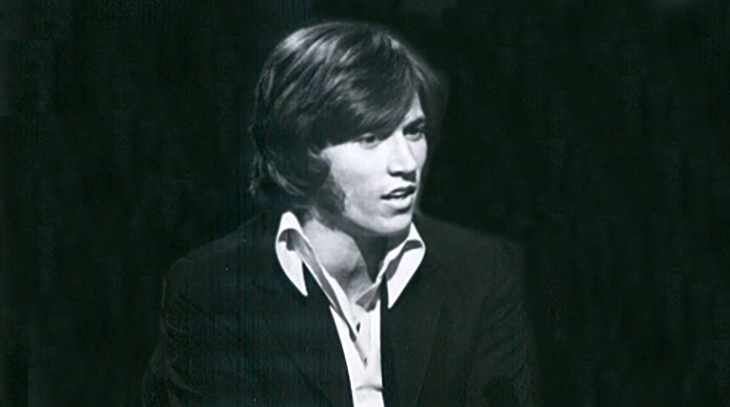 (Barry Gibb 1968 This is Tom Jones Photo: ABC Television)
(Barry Gibb 1968 This is Tom Jones Photo: ABC Television)
From their early 1960s hits like How Can You Mend a Broken Heart, I’ve Gotta Get a Message To You, and I Started a Joke, to their later 1970s-1980s “disco” songs Saturday Night Fever and Stayin’ Alive, Barry Gibb and the Bee Gees were at the top of the song charts. There were plenty of highlights and low points for the Gibb brothers before, during, and after their heyday.
England and Australia Musical Beginnings
Baby boomer and prolific singer-songwriter Barry Gibb was born on September 1, 1946 in Douglas, on the Isle of Man in the U.K. Musicians in Gibb’s family included his drummer father Hugh Gibb, and his younger brothers – twins Robin Gibb (1949-2012) and Maurice Gibb (1949-2003), and youngest brother Andy Gibb (1958-1988).
A severe scalding from a teapot when he was a toddler landed Barry Gibb in hospital for two years, recovering from burns.
By the end of 1955 the Gibb family had moved to Manchester, England and Barry was given a guitar for Christmas. 9-year-old Barry and his 6-year-old twin brothers Robin and Maurice began singing harmonies in 1955 and turned to covering popular rock and pop tunes. Their first paying gig 2 years was in December 1957 at the ripe old ages of 11 and 8. The brothers performed under the group names The Rattlesnakes, and Wee Johnny Hayes and the Blue Cats.
Musical influences for Barry Gibb during his childhood and pre-teen years were The Everly Brothers, Paul Anka, Cliff Richard, Frankie Valli, and Roy Orbison, of whom he said that when he heard Orbison sing Crying,
“To me that was the voice of God.”
The Gibb family emigrated to Australia by boat in August 1958, and the brothers Gibb changed the name of the band to the Bee Gees. Thirteen-year-old Barry Gibb began writing his own songs.
By the end of September 1961, Barry Gibb had quit school at the age of 15, and the Gibb family had moved from Redcliffe to the beach resort town Surfers Paradise on Australia’s Gold Coast. The Bee Gees performed at hotels and clubs on the Gold Coast for a couple of years before the Gibb family moved to Sydney, Australia early in 1963. Around this time the Bee Gees were signed to their first recording contract and released some singles, which charted in the top 100 in Australia.
By 1966 Barry Gibb’s songs had been recorded by The Bee Gees and other Australian recording artists. The Bee Gees singles Spicks and Specks (1966) with I Am the World on the B side, written by Barry Gibb, was released in September 1966 and made it to #5 in Australia.
Barry had met an Australian Maureen Bates while the Gibbs were in Sydney, and they were married on August 22, 1966, just before his 20th birthday. The marriage was kept secret so as not to deter female fans.
Fellow Australian musicians – lead guitarist Vince Melouney and drummer Colin Petersen – had also moved to the UK. Melouney joined the group in 1967 and he can be heard on their first 4 albums; Colin Peterson played for the Bee Gees until 1969. Below, the Bee Gees circa 1967 from left: Barry Gibb, Robin Gibb, Vince Melouney, Maurice Gibb, and Colin Petersen.
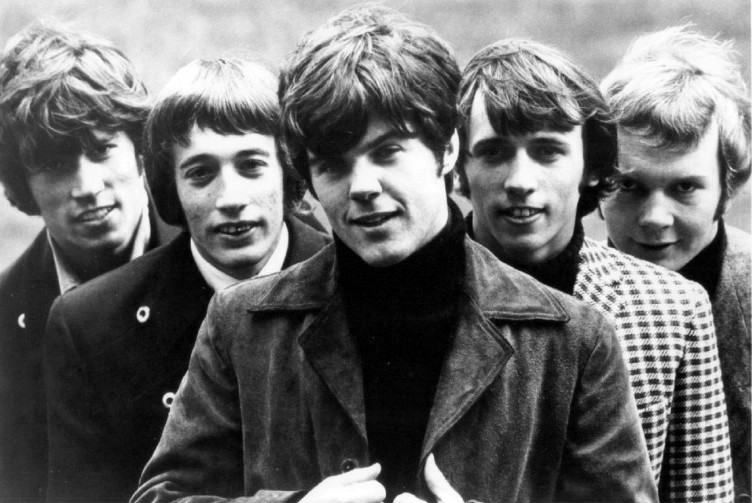 (Bee Gees circa 1967 Photo: Atco Records)
(Bee Gees circa 1967 Photo: Atco Records)
Barry & Maureen Gibb, Robin and Maurice sailed to England in January 1967 and were promptly signed to a contract with the Robert Stigwood Organization, with Robert Stigwood himself acting as their manager. The album Bee Gees’ 1st (1967) was released in July 1967 and contained the three Top 20 singles Holiday, To Love Somebody and New York Mining Disaster.
1960s Chart Hits & Breakups
New York Mining Disaster 1941 (1967) was released in April 1967 before the Bee Gees’ 1st album came out, and the song was their American debut single, bringing them to the attention of North American baby boomers and making it to #14 on the U.S. charts. New York Mining Disaster 1941 was written by Barry Gibb and Robin Gibb, with Robin Gibb singing lead vocals, and Barry and Robin singing harmonies.
To Love Somebody (1967) was originally written by Barry Gibb and Robin Gibb for Otis Redding at the request of their manager, Robert Stigwood. In a 2011 interview with Mojo magazine, Barry Gibb said of writing To Love Somebody that,
“It was for Robert. I say that unabashedly. He asked me to write a song for him, personally. It was written in New York and played to Otis but, personally, it was for Robert. He meant a great deal to me. I don’t think it was a homosexual affection but a tremendous admiration for this man’s abilities and gifts.“
The Bee Gees recorded To Love Somebody with lead vocals by Barry Gibb in March 1967, and released the single in June 1967. The Bee Gees To Love Somebody went to #6 in Australia and #17 in the United States, and has since been covered by many artists including Eric Burdon and the Animals, Rod Stewart, Janis Joplin, Nina Simone, Roberta Flack, Hank Williams Jr., Michael Bolton, and many others.
Holiday (1967) was written by Barry Gibb and Robin Gibb, who shared lead vocals on the song. Recorded at the same time as To Love Somebody in March 1967, when released in the United States in September 1967 Holiday went to #16 on the U.S. charts.
While in New York during a tour of the United States, Barry, Robin, and Maurice Gibb wrote the song Massachusetts (1967). Massachusetts was recorded in August 1967 in London with Robin Gibb singing lead vocals, and released first in England in September 19, 1967, then later in America. Massachusetts was the Bee Gees first #1 hit in the U.K.; it reached #11 in the U.S. Below, the Bee Gees perform Massachusetts on Top of the Pops live in 1997.
On September 21, 1967, the Bee Gees taped an episode of Top of the Pops for the BBC, and Barry Gibb met 17-year-old Linda Gray, Miss Edinburgh. They had an immediate tryst and Barry invited Linda to a party at Robert Stigwood’s house to celebrate the success of Massachusetts becoming their first #1 single in the U.K.
At the beginning of December 1967, Barry Gibb’s marriage to Maureen and their recent separation came to light in the press; until then, it had been kept secret, with Barry denying he was married. In the biography The Bee Gees: Tales of the Brothers Gibb (2000) by Hector Cook, Melinda Bilyeu, & Andrew Mon Hughes, Barry said he kept the marriage secret because he didn’t want to spoil his image.
“The reason we split up was, I suppose, 50-50 between us. The kind of person I am – obsessed with my career – it runs my whole life…I could not have taken her with me as a girlfriend because if we had split up over here, she would have been on her own, so we got married 3 months before we left and that was the biggest mistake I ever made in my life…After we arrived in Britain, I was working most nights and she would hardly ever see me.”
Barry said that he and Maureen were incompatible and it took just over a year of marriage before he walked out.
Meanwhile, the stress of Barry Gibb’s disintegrating marriage was beginning to wear on him. On December 23, 1967, Barry and Robin Gibb flew to Australia and were overwhelmed by attention from the Australian press. During a stopover in Turkey on the very long return flight back to England after Christmas, both Robin and Barry checked into a hospital and were told they were suffering from mental and physical exhaustion.
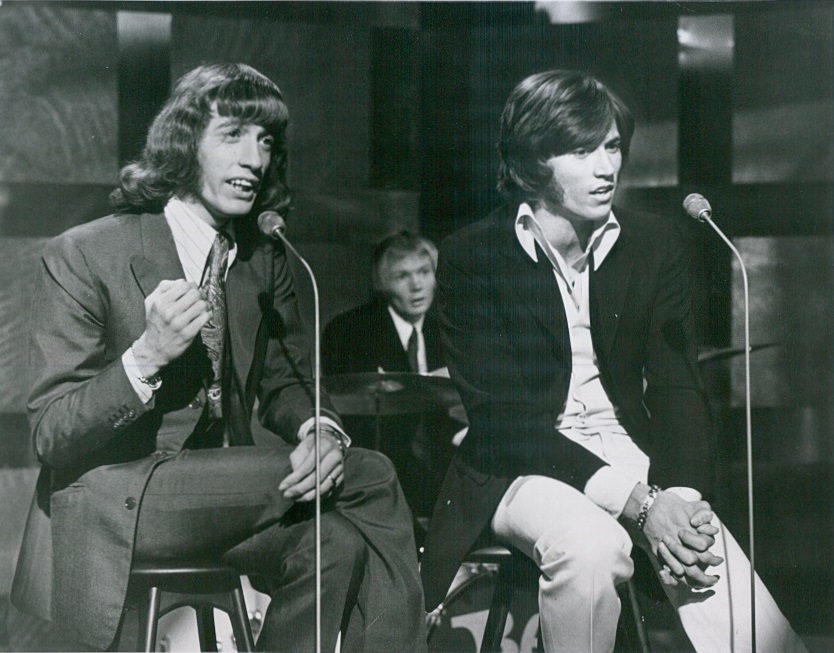 (Robin & Barry Gibb with drummer Colin Petersen 1969 This is Tom Jones Photo: ABC Television)
(Robin & Barry Gibb with drummer Colin Petersen 1969 This is Tom Jones Photo: ABC Television)
In January 1968, the Bee Gees took a promotional trip to the U.S. and appeared on both The Smothers Brothers Show and the The Ed Sullivan Show. Success was taking its toll and the group were beginning to be at odds with each other on and off stage over their musical direction.
Barry’s girlfriend Linda Gray eventually moved from Scotland to England, and moved in with Barry.
The hit single Words (1968) was written by Barry, Robin, and Maurice Gibb and recorded in October 1967. After it’s January 1968 release, Words went to reached #15 in the United States. Below, the Bee Gees singing Words live on The Smothers Brothers Comedy Hour in 1968 for their baby boomer fans, with Barry Gibb on lead vocals.
I’ve Gotta Get a Message to You (1968) written by Barry, Robin, and Maurice Gibb was recorded in July and released in September 1968. I’ve Gotta Get a Message to You was the Bee Gees second #1 hit in the U.K. and made it to #8 on the U.S. charts. Below, the Bee Gees sing I’ve Gotta Get a Message to You in Las Vegas in 1997.
The Bee Gees single I Started a Joke (1968) was released in December 1968 and became a #1 hit in Australia, and #6 in the U.S. Since 1968, numerous other artists including Lulu (Maurice Gibb’s first wife) have covered I Started a Joke.
By the end of 1968 Robin Gibb had married Molly Hullis; they had two children – son Spencer (b. 1972) and Melissa (b. 1974). Robin and Barry Gibb had taken turns singing lead vocals for the Bee Gees, but Barry got more attention from the press because of his looks, and his leadership of the group became a source of friction. In March 1969 Robin Gibb quit the Bee Gees to go solo.
The Bee Gees, consisting of a drummer with Barry and Maurice Gibb, starred in the BBC comedy movie Cucumber Castle (1969) that included Maurice’s girlfriend, pop singer Lulu, Blind Faith musicians Eric Clapton and Steve Winwood, and uncredited cameos by Roger Daltrey (The Who), Donovan, Marianne Faithful, and Mick Jagger.
Barry and Maurice released a Bee Gees single before announcing the band’s break up in December 1969.
Bee Gees Reunion
Barry co-wrote and produced songs with Samantha Sang during their break, and newlywed Maurice Gibb (he’d married pop singer Lulu in February 1969) released a solo single.
Barry and Maureen’s divorce was finalized in July 1970. On September 1, 1970, Linda Gray and Barry Gibb were married in Caxton Hall on his 24th birthday.
With their solo careers fizzling, the brothers Gibb reunited in August of 1970 and began writing songs again. They wrote two songs in their first writing session together that would make it to the Top 3 in the U.S. – Lonely Days (1970), and How Can You Mend a Broken Heart (1971).
Both songs are suggestive of the feelings of the brothers while the Bee Gees had been broken up. The Bee Gees have said the ballad Lonely Days was written in 10 minutes by Barry, Robin, and Maurice Gibb. They recorded Lonely Days on August 21, 1970 and when it was released in November 1970, it became a #3 hit single in the U.S.
The Bee Gees performed Lonely Days on The Tonight Show Starring Johnny Carson, The Johnny Cash Show, The Andy Williams Show, The Dick Cavett Show, and The Ed Sullivan Show.
How Can You Mend a Broken Heart (1971) written by Barry Gibb and Robin Gibb and recorded in January 1971, gave the Bee Gees their first #1 hit single in the U.S. when it was released in May 1971.
Although North American baby boomers loved How Can You Mend a Broken Heart, it inexplicably failed to chart in the U.K.
How Can You Mend a Broken Heart was nominated for a Grammy Award for Best Vocal Performance by a Duo, Group or Chorus. Other artists that have recorded How Can You Mend a Broken Heart include Johnny Mathis, Al Green, Cher, Teddy Pendergrass, and Barry Manilow. When Michael Bublé recorded the song in 2003, Barry Gibb performed backup vocals.
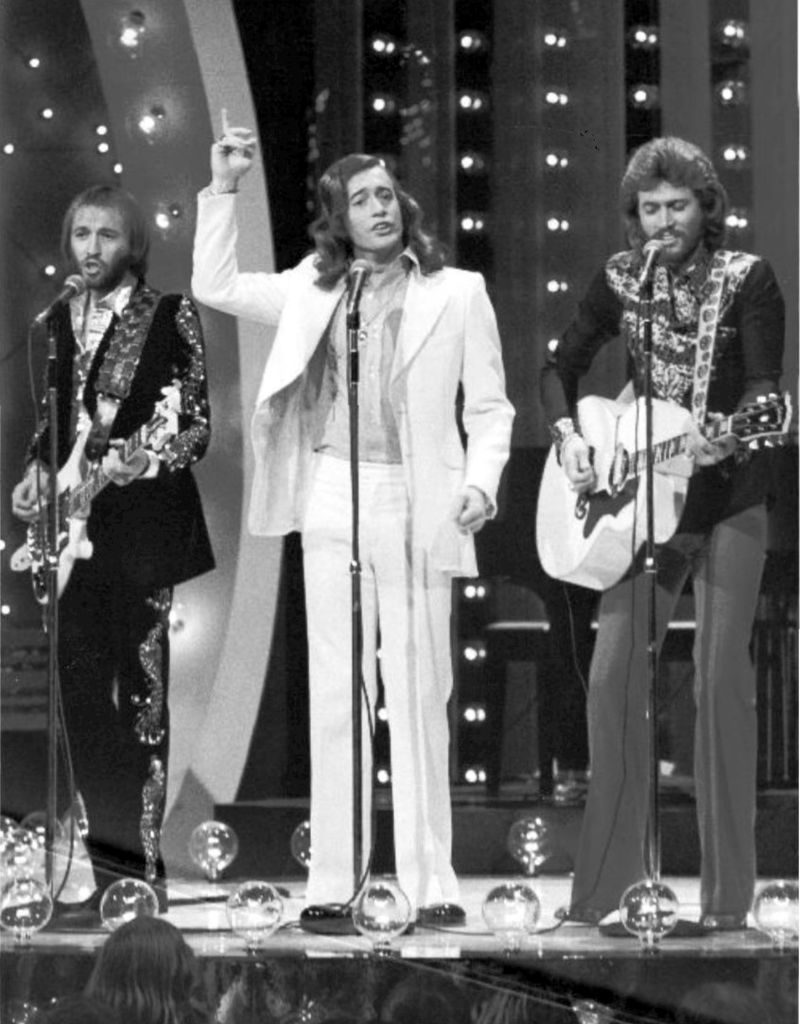 (Bee Gees 1973 Bert Sugarman’s The Midnight Special Photo: NBC Television)
(Bee Gees 1973 Bert Sugarman’s The Midnight Special Photo: NBC Television)
Over the next several years in the early 1970’s, the Bee Gees continued to record and release albums and singles, but failed to crack the Top 15 in the U.S.
Maurice Gibb’s marriage to Lulu unraveled due to their separate careers and his heavy drinking; they divorced in 1973. Maurice married Yvonne Spenceley in 1975, and they had two children – son Adam Gibb (b.1976) and daughter Samantha Gibb (b.1980)
Bee Gees manager Robert Stigwood arranged for them to work with Atlantic records producer Arif Mardin in Miami in 1974. The Bee Gees toured the U.S. and England that year, playing smaller clubs and venues. They were ready for their next big break.
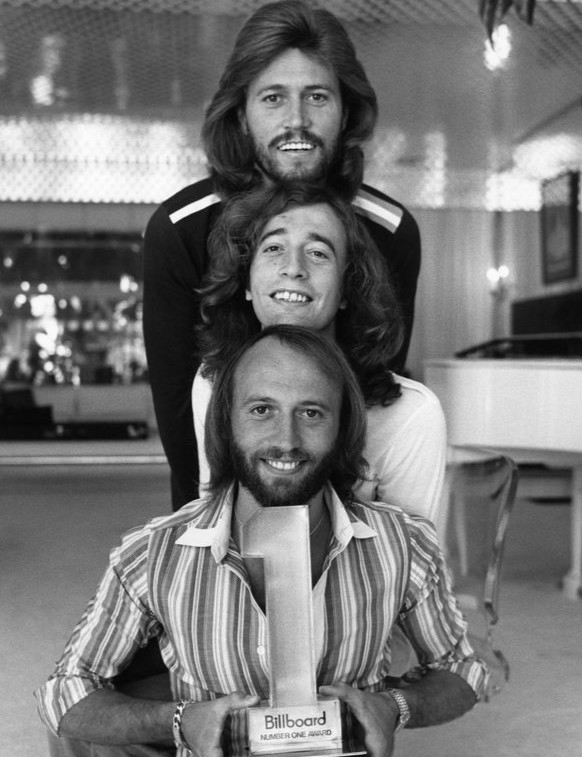 (Maurice, Robin & Barry Gibb 1977 Photo: NBC Television)
(Maurice, Robin & Barry Gibb 1977 Photo: NBC Television)
The Bee Gees moved to Miami in 1975, where the three Gibb brothers all lived within three blocks from each other at one point. Neighbours included Jennifer Lopez and Phil Collins.
Their songwriting style began to change from the slower ballad type of songs that had thrust them into fame in the 1960’s, to a newer up-tempo dance and R&B style that was heralding the beginning of the “disco” era embraced by baby boomers. Recorded in Miami, Main Course (1975) was the Bee Gee’s 13th studio album, and last album for Atlantic Records.
Main Course contained several hit singles including the Top Ten songs Jive Talkin’ and Nights on Broadway, and is notable for the discovery of singer-songwriter Barry Gibb’s falsetto singing voice during recording sessions.
Featuring Barry singing lead vocals, Jive Talkin’ became a #1 hit for the Bee Gees, their first since 1971’s How Can You Mend a Broken Heart. Jive Talkin’ was included on the Saturday Night Fever soundtrack.
Nights on Broadway (1975) was released right after Jive Talkin’, in September 1975. Written by the three Gibb brothers – Barry, Robin, and Maurice – the Bee Gees sing their #7 U.S. hit single Nights on Broadway on Burt Sugarman’s The Midnight Special in 1975.
Songs on The Children of the World album were recorded in early 1976 and produced 3 Top 12 hit singles. Love Me, written by Barry and Robin Gibb, became a Top 20 U.S. hit for Yvonne Elliman in September 1976. Whereas formerly Robin and Barry had shared lead vocals equally, most of the songs on The Children of the World album featured Barry Gibb on lead vocals.
By the end of 1976, 18-year-old Andy Gibb, who had been trying to break into the music business in Australia, had been signed to RSO Records by the Bee Gees manager Robert Stigwood, married his girlfriend Kim Reeder, and moved to Miami to work with brother Barry Gibb on songs.
Kim and Andy Gibb’s marriage was soon over; they separated in 1977 before Kim knew she was pregnant, and their divorce was finalized in 1978 after the birth of daughter Peta Gibb in January of that year.
The first single released from The Children of the World album in June was You Should be Dancing (1976), which was later included on the Saturday Night Fever (1977) soundtrack (it had been used in a scene that was deleted), the Bee Gees third #1 hit single You Should Be Dancing (1976). Barry Gibb sings lead vocals in what later became his trademark falsetto, and Barry’s lookalike youngest brother Andy Gibb joined the Bee Gees in performing You Should be Dancing.
Barry Gibb wrote both I Just Want to Be Your Everything (1977) in a Bermuda hotel room with “his best friend” younger brother Andy Gibb in 1976. Andy would later say
“When Barry writes, it is very hard to collaborate with him, because he is so quick. And before I knew it he was starting to do the chorus of [‘I Just Want to Be Your Everything’], and I thought, ‘Wow what a hook!’. He’s an expert at his craft. Within about 20 minutes, he’d written a number one record.“
Andy Gibb recorded I Just Want to Be Your Everything in 1976 with Barry Gibb singing backup vocals, and it became Andy’s first #1 U.S. hit single when it was released in May 1977. Unfortunately, Andy quickly embraced the pop star lifestyle and began using cocaine.
Saturday Night Fever: Stayin’ Alive on Top of the Charts
In early 1977 the Bee Gees manager Robert Stigwood had asked the Bee Gees to come up with songs for the soundtrack of a new disco movie he was producing. The result was 5 completely new songs (Stayin’ Alive, How Deep is Your Love, Night Fever, If I Can’t Have You, and More Than a Woman) written by Barry, Robin, and Maurice Gibb over a weekend, that made it onto the double album soundtrack of Saturday Night Fever (1977).
Saturday Night Fever (1977) became the best-selling soundtrack to-date after the movie’s November 1977 release, a record that stood until the soundtrack from The Bodyguard (1992) came out, featuring Whitney Houston.
All told, the Bee Gees contributed to 7 songs to the Saturday Night Fever soundtrack. In addition to the previously recorded and released Bee Gees #1 hit songs You Should be Dancing and Jive Talkin’ which were included on the album, the Bee Gees sang and recorded their new songs Stayin’ Alive, How Deep is Your Love, and Night Fever. Yvonne Elliman recorded their song If I Can’t Have You, and Tavares recorded More Than a Woman.
Featuring Barry Gibb on lead vocals, How Deep Is Your Love was the first single released from the Saturday Night Live soundtrack and it spent 17 weeks on the U.S. Top 10 charts, reaching #1 on December 24th, 1977.
How Deep Is Your Love won the 1978 Grammy Award for Best Pop Vocal Performance by a Group, and has been featured in numerous movies and television series including Donnie Brasco, Anger Management, Sex and the City, Nip/Tuck, The Simpsons, and Parenthood, among others. In 1996 the band Take That had a #1 U.K. hit single with their recording of How Deep Is Your Love.
The Saturday Night Fever album was released in mid-November 1977 and the movie was set to hit theaters on December 16.
Before the movie was even released, fans that had seen the trailer where John Travolta walks down the street while Stayin’ Alive plays over the opening credits (below), called radio stations requesting the song. Stayin’ Alive was the second new song from the Saturday Night Fever movie soundtrack to be released, on December 15, 1977, and when it got to #1 in the U.S. in February 1978, it stayed there for 4 weeks.
At the 1979 Grammy Awards, the Bee Gees won the Best Arrangement of Voices Grammy Award for Stayin’ Alive. Stayin’ Alive has 104 beats per minute, and a study on medical professionals showed that chest compression quality (ideally 100-120 beats per minute) was improved when practitioners thought about the song Stayin’ Alive. Stayin’ Alive has been used in American and British medical videos about CPR, and the song was featured in an episode of the medical drama Gray’s Anatomy.
The 1983 Saturday Night Live sequel movie Stayin’ Alive features the title song at the end of the movie.
Released in December 1977, Samantha Sang’s #3 hit song Emotion was written by Barry and Robin Gibb, with Barry Gibb providing background vocals and harmony on the song. Emotion was later covered by the Bee Gees in 1994, and it became a Top 10 hit for Destiny’s Child in 2001.
When Stayin’ Alive fell out of the #1 spot, it was replaced by Andy Gibb’s second #1 hit single, the ballad Love is Thicker Than Water, which had been released in September 1977. Although (Love is) Thicker Than Water was primarily written by Barry Gibb in 1976, Andy Gibb came up with the song title, and is credited as co-writer.
The song that pushed (Love is) Thicker Than Water out of the #1 spot on the U.S. charts was the Bee Gees recording of their song Night Fever (1978), released in February of that year. Night Fever was the third Bee Gees single from the Saturday Night Fever soundtrack, and stayed at the #1 spot in the U.S. for 7 weeks.
The song that pushed Night Fever out of the #1 spot on the U.S. charts in 1978 was Yvonne Elliman’s If I Can’t Have You. The success of If I Can’t Have You made Barry Gibb the only person to have written 4 #1 hit singles in a row – Stayin’ Alive, Love is Thicker Than Water, Night Fever, and If I Can’t Have You.
In addition to the individual song contributions that won the Bee Gees Grammy Awards and AMA (American Music Awards) from the Saturday Night Fever soundtrack, the Bee Gees shared in the Saturday Night Fever 1979 Grammy Awards for Best Pop Vocal Performance by a Duo or Group (1979), Album of the Year, and Producer of the Year. The Bee Gees also won the AMA in 1979 and 1980 for Favorite Pop/Rock Band, Duo or Group.
Andy Gibb’s third single Shadow Dancing was written by all four Gibb brothers – Barry, Robin, Maurice & Andy Gibb – in Los Angeles while the Bee Gees were filming the musical comedy Sgt. Pepper’s Lonely Hearts Club Band (1978). Barry Gibb also produced the Shadow Dancing (1978) album for Andy.
Shadow Dancing was Andy Gibb’s third #1 hit single in the U.S., staying there for 7 weeks through June/July 1978 and setting a record for a new artist, to have their first 3 songs all become #1 hit singles. Other Andy Gibb Top 5 hit singles include An Everlasting Love (1978) written by Barry Gibb, and Desire (1980) written by Barry, Robin, and Maurice Gibb. Below, Andy Gibb sings Shadow Dancing.
The movie musical Sgt. Pepper’s Lonely Hearts Club Band was produced by the Bee Gees manager Robert Stigwood and featured the Bee Gees and Peter Frampton singing Beatles songs. Sgt. Pepper’s Lonely Hearts Club Band was released in July 1978 and neither critics nor the Beatles liked the movie. However, Sgt. Pepper’s Lonely Hearts Club Band did well at the box office, perhaps no surprise given the popularity of not only the Beatles and the Bee Gees songs, but the numerous other actors and contributing artists who appeared in the movie – Peter Frampton at the height of his Frampton Comes Alive! fame, comedian Steve Martin, Aerosmith, Alice Cooper, George Burns, and Billy Preston, to name a few.
The soundtrack album for the movie Grease (1978) was the second best-selling album of 1978 in the U.S., only exceeded by the Saturday Night Fever album that year. The title track Grease was written and co-produced by Barry Gibb, and sung by Frankie Valli, with Barry contributing vocals and Peter Frampton playing guitar. Grease the single was released in May 1978 and became a #1 hit single in the U.S. that year as well.
Too Much Heaven
Thanks to baby boomers, the massive success of Saturday Night Fever and their singles from the soundtrack album gave the Bee Gees brothers and band members a lifestyle that included a fleet of cars, houses on different continents, and planes to get there. Unfortunately it also gave them access to all the drugs and alcohol they wanted, and for Andy, Maurice and Robin Gibb, alcohol and drug abuse would destroy their health.
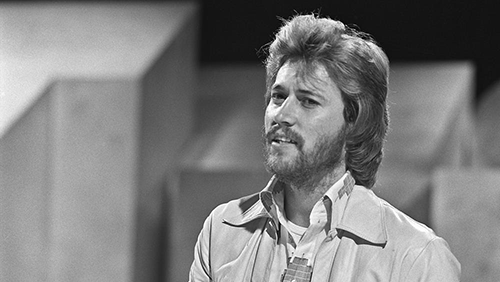 (Barry Gibb 1973 TopPop Photo: AVRO Beeld En Geluidwiki)
(Barry Gibb 1973 TopPop Photo: AVRO Beeld En Geluidwiki)
The first three tracks from the Bee Gees 15th studio album Spirits Having Flown (1979) became #1 hit singles and was their most successful album (aside from their contribution on the Saturday Night Fever soundtrack). Barry Gibb carried the heaviest load on the album with songwriting, producing, singing lead vocals, and sometimes overdubbing background vocals as well. Robin Gibb contributed to songwriting, and Maurice Gibb was to provide bass guitar work. Maurice’s back troubles and alcoholism kept him from a more active role in the album.
The ballad Too Much Heaven (1978) was written by Barry, Robin, and Maurice Gibb, in 1978 on the same day they wrote Andy Gibb’s 1978 hit single Shadow Dancing, and the song Tragedy, during a break from filming the movie Sgt. Pepper’s Lonely Hearts Club Band in 1978.
Too Much Heaven was released in October 1978 and in January 1979 it hit the #1 spot on the Billboard Hot 100 chart in the U.S., proving popular with baby boomer fans.
Tragedy (1979) released in February 1979, was the Bee Gees eighth #1 hit single in the U.S. in March 1979. The Bee Gees third single from their Spirits Having Flown album, the funk song Love You Inside Out (1979) was released in April 1979. Written by Barry, Robin, and Maurice Gibb, Love You Inside Out was the Bee Gees ninth #1 hit single, sixth consecutive #1 hit single, and third hit single from the Spirits Having Flown Album, in the U.S. Love You Inside Out reached #1 in the U.K.in February 1979 and in the U.S. in March of 1979.
By early 1979, Andy Gibb‘s use of cocaine had seriously affected his ability to write and sing. In May of that year Andy recorded songs for his After Dark (1980) album, most of which were either written or co-written by Barry Gibb. In addition to co-producing the After Dark album, Barry Gibb also sang background and harmony vocals, contributed some lead vocals, and played acoustic guitar on Andy’s album. Despite Barry and Andy Gibb’s efforts, After Dark was a flop, producing only one Top 10 hit single, Desire (written by Barry, Robin, and Maurice Gibb).
Barbra Streisand had asked Barry Gibb to write songs for her 22nd album, Guilty (1980). When Guilty (1980) was released with Barbra Streisand and Barry Gibb on the cover, it became Streisand’s top-selling album internationally. All the songs on Guilty were either written or co-written by Barry Gibb, and produced by Barry Gibb with Karl Richardson and Albhy Galuten. Streisand’s single Woman in Love written by Barry and Robin Gibb, was a #1 hit for 3 weeks, and was nominated for Song of the Year and Record of the Year.
Guilty was nominated for a Grammy for Album of the Year in 1981. The Barbra Streisand/Barry Gibb duet on the title track Guilty was released in October 1980. In addition to co-writing the single Guilty with brothers Robin and Maurice Gibb, and co-producing and singing with Streisand on the single, Barry Gibb played guitar on Guilty. Guilty was a #3 chart Hot 100 singles chart hit and won the 1981 Grammy Award for Best Pop Vocal Performance – Duo or Group.
The ballad What Kind of Fool (1980) written by Barry Gibb and Albhy Galuten for Barbra Streisand, was recorded as a duet with Streisand and Barry Gibb. When What Kind of Fool was released in January 1981, it climbed to the Top 10 on the U.S. charts (#1 on the U.S. Adult Contemporary charts).
Robin Gibb‘s first marriage to Molly Hullis ended in a bitter divorce in 1980 after years of separation; he complained in the press about being unable to see his children for several years, and was sentenced to 14 days in prison in 1983 for talking about his former marriage. He met druid-poet Dwina Murphy in 1980 and they had son Robin-John Gibb in 1983. Dwina and Robin Gibb were in open marriage from 1985 until Robin’s death.
Andy Gibb had met 31-year-old actress Victoria Principal in early 1980 and they became a couple, until 23-year-old Andy’s drug use caused Principal to end their relationship a little over a year after it began. Andy Gibb was devastated and his cocaine use increased.
Meanwhile, the disco era was dying, and with it the popularity of the Bee Gees with their maturing baby boomer fans. During a Bee Gees recording hiatus beginning in 1981, Barry Gibb continued to write songs, produce and perform for himself and other artists, including Dionne Warwick, Kenny Rogers, Diana Ross, Elton John, and brothers Andy and Robin Gibb. Barry, Robin, and Maurice Gibb wrote the #1 hit single duet by Dolly Parton and Kenny Rogers, Islands in the Stream (1983).
The Bee Gees Robin, Maurice & Barry Gibb also wrote 5 songs for the soundtrack of the Saturday Night Fever sequel movie, Stayin’ Alive (1983), which was co-produced by their manager Robert Stigwood and Sylvester Stallone. One of the Bee Gees songs from the Stayin’ Alive soundtrack, The Woman in You (1983), made it to #24 on the U.S. charts, but neither the movie nor the soundtrack approached the commercial successes of Saturday Night Fever; baby boomers had declared disco dead.
After taking a 6-year break, the Bee Gees began recording their first new album in 6 years, E.S.P., in 1987. The three brothers are credited on all of the songs on the album and there was a more equal distribution of lead vocals than on their previous albums. During their hiatus both Barry and Robin had gotten used to their own individual recording styles, and during the recording sessions for E.S.P. they argued frequently. Although E.S.P. sold well in Europe and the Bee Gees won the American Music Award for International Artist, North American baby boomers weren’t interested. The only single from the E.S.P. album to crack the U.S. Hot 100 charts was the #75 single You Win Again, which was a #1 song in the U.K. and Australia.
The screenplay for the British comedy movie Hawks (1988) starring Timothy Dalton and Anthony Edwards was based on a short story co-written by Barry Gibb and David English, and Barry Gibb wrote or co-wrote all the songs for the movie, most of them in 1986.
The song Chain Reaction (1985) included in the Hawks soundtrack had been written by Barry, Robin, and Maurice Gibb for Diana Ross, who released it in 1985 and again in 1986. The Bee Gees sang backing vocals for Diana Ross on Chain Reaction. Although Chain Reaction was only a #95 single in the U.S., it was a #1 hit single for Diana Ross in the U.K. and Australia. The rest of the songs on the Hawks soundtrack were performed by Barry Gibb, but the soundtrack was only released in the U.K. in September 1988.
Farewell, Brothers Gibb
A few days after his 30th birthday, Barry’s youngest brother Andy Gibb died on March 10, 1988 from inflammation of the heart caused by a viral infection. His family has said that Andy Gibb’s previous heavy alcohol and drug abuse over many years and lack of proper nutrition damaged his heart.
The eighteenth Bee Gees studio album One (1989) yielded the #7 US hit single from the title track, One. Released in June 1989, One was the only U.S. Top 10 hit for the Bee Gees in the 1980’s, and was their biggest hit single since 1979’s Love You Inside Out. One stayed in the U.S. Top 40 for ten weeks, and also went to #1 on the U.S. AC charts for 2 weeks in September 1989.
The Bee Gees continued recording albums and releasing singles during the early 1990’s and had some hits in Europe, but failed to crack the US Top 30 in the first half of the decade. Maurice finally kicked his alcohol addiction after a month-long bender in 1991 with some intervention from Barry and Robin, who didn’t want to lose another brother. Linda and Barry’s Gibb’s fourth child, daughter Alexandra (Ali) Gibb was born 16 weeks early, on December 29, 1991.
In 1994 the Bee Gees were inducted into the Songwriters Hall of Fame. A planned tour to promote a new album was cancelled in February of that year, because Barry was experiencing problems with arthritis in his back, hand and knee, which he still suffers from today. In an interview with the Mirror in 2000, a 50+ Barry Gibb talked about the pain he’s suffered from since 1985 and the back surgery he had after going on tour in 1989. His thumb is out of it’s socket due to inflammatory arthritis, making it extremely painful for him to grip (ie, a guitar). Gibb has said his love of playing tennis exacerbated his arthritis problems and back pain, but that Miami’s warm weather helps. He quit smoking in the mid-1990’s, and after a heart scare with palpitations which he put down to stress, was feeling better due to dietary and lifestyle changes – swimming, eating less red meat, and no dairy products.
Despite his aches and pains from aging and arthritis since the mid 1980’s, Barry has written or co-written songs for other artists like Tina Turner and Cliff Richard, and for the scores of several movies, including the films Cadillac Man (1990), Donnie Brasco (1997) Good Will Hunting (1997), Big Daddy (1999) and Mystery Men (1999).
With Barry Gibb now in his 50+ years, the last Bee Gees song to break into the U.S. Top 30 was the ballad Alone (1997) written by Barry, Robin, and Maurice Gibb and included on their best-selling, 21st studio album, Still Waters (1997). Still Waters was a Top 11 album in the U.S., and the Bee Gees biggest selling album since 1979’s Spirits Having Flown.
Alone made it to #5 in the U.K. and #28 in the U.S. Barry and Robin trade lead vocals on Alone. That same year, the Bee Gees were inducted into the Rock & Roll Hall of Fame, and the biographical movie Keppel Road: The Life and Music of the Bee Gees was released on Bravo in the U.S. At the 1997 World Music Awards, the Bee Gees were given the Legend Award.
In the early 2000’s, and older Barry Gibb and his brothers Maurice and Robin continued to write songs and perform together. Barry Gibb also co-wrote songs with his sons Ashley and Steve Gibb, for them and other artists including Cliff Richard and Barbra Streisand. Barry sang duets with friend Michael Jackson (who was son Michael Gibb’s godfather), and background for Michael Bublé on his version of the Bee Gees How Can You Mend a Broken Heart (2002). Below, Michael Bublé and Barry Gibb sing How Can You Mend a Broken Heart.
Barry’s younger brother Maurice Gibb suffered a heart attack and died on January 12, 2003 at the age of 54; complications from a twisted intestine was given as the cause of death. At the 2003 Grammy Awards, the Bee Gees were given the Legend Award, and Saturday Night Fever soundtrack was entered into the Grammy Hall of Fame in 2004.
Robin and Barry Gibb were the only surviving Gibb brothers, but they were the ones who had argued most often. They decided the Bee Gees couldn’t go on without Maurice, and the brothers drifted apart after the band broke up. In November 2008, Robin Gibb and his former housekeeper Claire Yang had a daughter – Snow Evelyn Robin Juliet Gibb – the result of a long-standing affair that was reported to have started in 2001.
Signaling a change of direction in his career, Barry Gibb and his wife Linda bought the Hendersonville, Tennessee (near Nashville) former home of June and Johnny Cash in 2006. They intended to restore the home and live there, but during renovation work in 2007 the house burned down (they later sold the property in 2014).
Barry mentored contestants on American Idol‘s 6th season in 2007, and wrote his first country song Drown on the River (2007) with his sons Steve and Ashley Gibb. Drown on the River was included in the soundtrack for the poker drama movie Deal (2008) starring Burt Reynolds and Vincent Van Patten.
In 2009, Barry and Linda Gibb became US citizens with dual British/American citizenship, homes in Miami Beach, and Beaconsfield, Buckinghamshire.
Barry’s brother Robin Gibb was diagnosed with colorectal cancer in November 2011, and underwent chemotherapy followed by intestinal surgery and pneumonia in March 2012. He died on May 20, 2012 from liver and kidney failure. Barry, the oldest sibling and now a senior citizen, was now the only surviving Gibb brother. Barry Gibb told Rolling Stone that he was very depressed for about a year and a half, until his wife and friend Paul McCartney encouraged him to go on with his life.
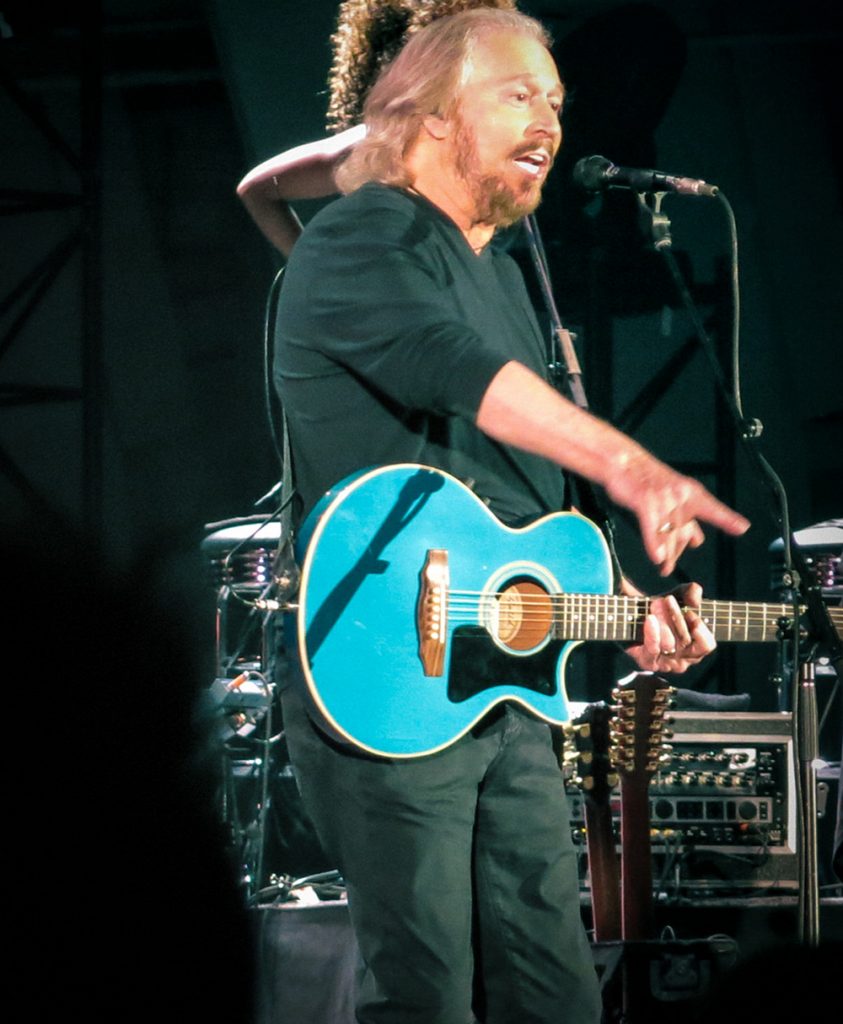 (Barry Gibb 2014 Hollywood Bowl Photo: Louise Palanker)
(Barry Gibb 2014 Hollywood Bowl Photo: Louise Palanker)
In 2012, Barry Gibb began working with country singer Ricky Scaggs on songs for Scagg’s album Music To My Ears (2012). Barry Gibb wrote the song Soldier’s Son, and recorded it as a duet with Ricky for the album.
In July 2012, Ricky Scaggs welcomed a still-grieving Barry Gibb to the Grand Ole Opry for his Opry debut; the duo sang 3 songs together, including the Bee Gees tune To Love Somebody.
Barry and his son Steve Gibb and Maurice’s daughter Samantha Gibb toured Australia in 2013 singing the Bee Gees songs.
Barry Gibb was in semi-retirement when he told Rolling Stone in 2014 that he’d been a collector of first editions, guitars, and guns, but stopped going to the shooting range when it affected his hearing. Gibb said he had no fear of death although he thinks about it a lot, and that when his time comes he wants it to be quick.
“A heart attack onstage would be ideal, right in the middle of ‘Stayin’ Alive.’“
On his bucket list? Seeing the inside of a nuclear submarine, and having one more hit song.
At the 2015 Grammy Awards the Bee Gees were given a Lifetime Achievement Award. The following year, grandfather Barry Gibb released his new album In the Now, with songs co-written by Barry and his sons Stephen and Ashley Gibb.
The Gibb family has been a close one over the years. Barry’s older sister Lesley Gibb lives in Australia; his father Hugh Gibb passed away soon after Andy died in 1988, and Barry’s mother Barbara Gibb passed away in 2016 at the age of 95. His in-laws have lived with Linda and Barry since 1978, and grandparents Barry and Linda Gibb celebrate their 50th wedding anniversary on September 1, 2020 (Barry’s 74th birthday).
Earlier in 2020, it was announced that actor Bradley Cooper will play Barry Gibb in a biopic about the Bee Gees that’s in development. Barry Gibb & the Bee Gees will continue Stayin’ Alive in music and now in film.
Note: This article was first published in 2016 as a three-part series Celebrating Seniors – Barry Gibb Turns 70. It has been updated with new & additional content.
*Images are believed to be in the public domain and/or Creative Commons licensed & sourced via Wikimedia Commons, Vimeo, YouTube, or Flickr, unless otherwise noted*

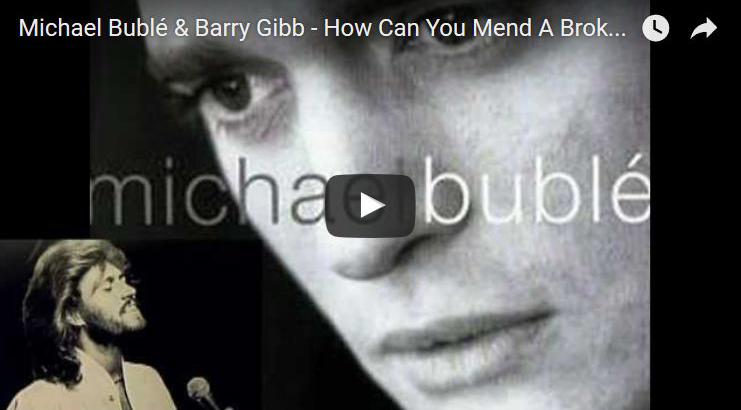
Comments
Ellie Jay Roberts June 25th, 2017 at 2:05pm
Lovely watching Glastonbury, the wonderful Barry Gibb.
Ursula Rietter April 30th, 2017 at 3:11pm
Excellent story. Well documented. Thank you :D